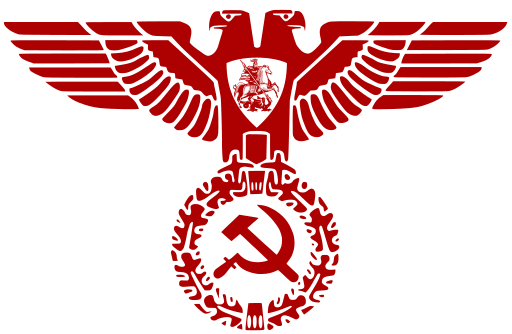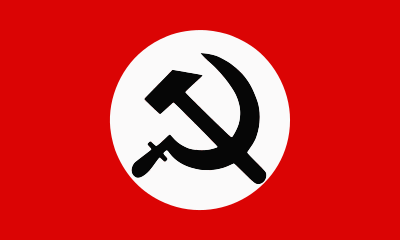https://en.wikipedia.org/wiki/National_Bolshevik_Party


The National Bolshevik Party (Национал-большевистская партия) is a Russian political party formed in 1993 by Alexander Dugin and other Russian political activists, such as Eduard Limonov, the party promoted the ideology of “National Bolshevism”, claimed to be a fusion of Soviet style Communism with Nazism and Fascism.
The party faced a splinter when Dugin left the party in 1998, later forming his own party called the Eurasia Party, and international organisations as part of the Eurasia Movement, Limonov and the NBP accused Dugin of being a Fascist in response.
Despite this split, Ukrainian elements of the Party continued to collaborate with Dugin and the Youth Wing of the Eurasia Party, the Eurasian Youth Union, networking with the Ukrainian far-right, such as the Brotherhood party:
In order to counter the largely imaginary threat of a “colour revolution” in Russia, the authorities sanctioned the creation of several “patriotic” youth movements: “Nashi” (Ours), “Rossiya molodaya” (Young Russia), “Molodaya gvardiya” (Young Guard), and some others. One of those movements wasEvraziyskiy soyuz molodezhi (Eurasian Youth Union, ESM) – under the leadership of Pavel Zarifullin and Valeriy Korovin – a National Bolshevik youth wing of Dugin’s Mezhdunarodnoe evraziyskoe dvizhenie (International Eurasianist Movement, MED). It is unclear who funded the ESM from 2005, but an analysis of the Russia-based Centre of Economic and Political Reforms shows that the ESM received several presidential grants amounting to more than 18.5 million Russian rubles in 2013-2014.
The ESM was active not only in Russia, but also in other countries, including Ukraine. During 2005-2007, branches of the ESM were established in the Ukrainian cities of Kyiv, Kharkiv, Sumy, Sevastopol and some others. These branches cooperated with the Ukrainian cells of the Natsional-Bol’shevistskaya Partiya (National-Bolshevik Party), as well as with Ukrainian far right parties such as the Rus’ky blok (Russian bloc), the misleadingly named Prohresyvna sotsialistychna partiya Ukrainy (Progressive Socialist Party of Ukraine, PSPU) led by Natalya Vitrenko, and “Bratstvo” (Brotherhood) headed by Dmytro Korchynsky. Both Vitrenko and Korchynsky were members of the Highest Council of Dugin’s MED.
The Ukrainian branches of the ESM remained on the margins of the Ukrainian political life, while most of its activities were limited to anti-NATO protests and other similar anti-Western actions, and did not produce any significant result in terms of undermining the Ukrainian state. Moreover, some of the Ukrainian members of the ESM did not share the radical anti-Ukrainian ideas of Neo-Eurasianism. For example, after two Russian members of the movement and one Ukrainian activist of the ESM vandalised Ukrainian state symbols on the Hoverla mountain in 2007, this led to the split in the Ukrainian ESM, as many did not support this act of vandalism. This also led to the termination of any cooperation between the ESM and “Bratstvo”, and Korchynsky left the Highest Council of the MED. The radicals, however, welcomed the act and were outspoken in their resentment of Ukraine’s sovereignty and territorial integrity.
While Dugin reached out to collaborate with the Russian establishment, the NBP remained in opposition, joining liberals, socialists and communists in protests against the government of Vladimir Putin, in 2007 the party was banned, causing it to rebrand as “The Other Russia”, after the breakout of the war in Donbas the party changed course and supported the Pro-Russian cause, sending a paramilitary unit known as the Interbrigades to participate in the war effort on behalf of the separatists.
Return to 000. MOC Notables Pro-Russian